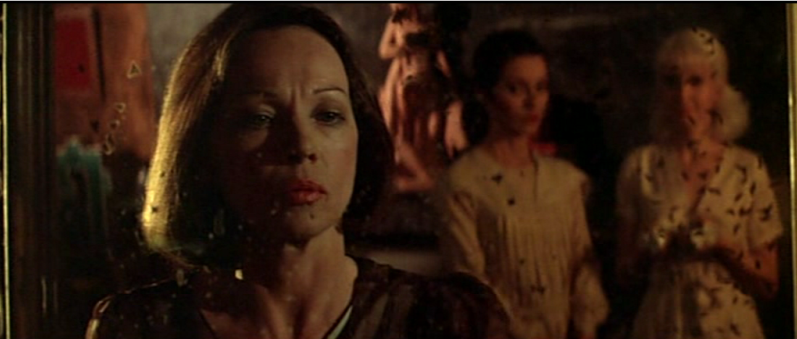
"No more Lubitsch," said Billy Wilder, at the Great Man's funeral.
"Worse than that," said William Wyler. "No more Lubitsch movies."
The suspicion, amounting almost to a certainty, that Jacques Rivette will make no more feature films to follow the very lovely Around a Small Mountain, can inspire the fan with an irrational, vertiginous fear: no more Rivette movies? But in fact, there are numerous existing Rivette movies still not seen, or not seen in anything like ideal circumstances. The iceberg-tip of his oeuvre that's commercially available is supported by a vast submerged continent of unreleased work. And the films themselves are so rich, so palatial, exploring them would take lifetimes.
Still, if one was looking either for Rivette-related work to supplement his great mad corpus, or something that sheds an interesting sidelight on a major Rivette work, Sérail (a.k.a. Surreal Estate, 1976), by the Argentinian writer-director and frequent Rivette collaborator Eduardo de Gregorio, is a useful addendum to the Rivette filmography, as well as being a fine film in itself and a fascinating introduction to Gregorio's own career, which has been extremely intermittent but seems well worth exploring based on this outing.
Like Celine and Julie Go Boating, the Rivette classic which Gregorio co-scripted (also working on Noroît, Duelle and Merry-Go-Round), Sérail draws from both Henry James's rarely-admired The Other House and the Alice novels of Lewis Carroll, but this movie also seems to use Celine and Julie itself as an urtext, down to casting Bulle Ogier and Marie-France Pisier as occupants of a strange, not-quite-haunted house, sliding in and out of an obscure period backstory.

Corin Redgrave plays a novelist looking for a retreat in the French countryside. Discovering a rambling, ill-kept mansion (bigger, more Gothic than Celine and Julie's mystery villa), he becomes intrigued by Ogier's yellow-clad madwoman, who shows him about, then vanishes mysteriously. Even more bafflingly, when he revisits the place, he finds Pisier, who denies all knowledge of the distracted blonde. Redgrave decides that this odd set-up is the perfect inspiration for a Gothic spook story which he can write while in residence, so he moves in.
What follows is a Russian Doll structure in which Redgrave investigates the puzzle and comes up with not one solution, but a whole series, each new explanation exposing the previous one as a ruse. At first, he thinks the women are eccentric sisters trying to drive up the price of their property by furnishing the house with its own romance and mystery. The mysterious "housekeeper" played by Leslie Caron leads him towards this conclusion and then confirms it, but then starts planting fresh clues that suggest a darker and more sexual motivation for the play-acting. Secret passages and two-way mirrors are hinted at.
What emerges is a much stranger yarn, one which never fully coalesces into an "explanation." Depending on one's inclinations, this is either less or much more satisfying than the initial Scooby Doo plot. What seems to be the case is that the younger women are actresses playing parts for the dubious benefit of Redgrave, whose mind starts to unravel when faced with such duplicity. Caron and maybe the house itself are masterminding the operation. Everything else is up for grabs (as may be the slender foundations I've hinted at). The idea of actors performing a semi-improvised "play" in a real location with an unwitting stooge as co-star is a beautifully Rivettian one, and also makes me think of James Whale's film of Ernest Vajda's play The Great Garrick, in which one actor finds himself in an inn peopled entirely with fellow thespians seeking to deceive him with a carefully planned farce in which he is cast as fall guy. Our hero sees through the deception but misinterprets the facts when an actual real-live person, in the midst of an actual narrative crisis of her own, enters the premises and the plot...

Redgrave's disintegration, faced with a world where no interpretation of events can be assumed to be correct, is very compelling: I particularly like his monologue to the shaving mirror, collapsing from a speech from Macbeth to an obscene and barely coherent rant ("...if you think your fucking going to get away with it you've got another fucking come [snorts] think coming..." Yes, you read that correctly) reminiscent of late-period Mel Gibson.
And all the while, little interpolations, like portraits which dissolve in and out of existence on the walls, or the pages of the novel Redgrave is writing, which at one point fade to blankness as if typed in disappearing ink, or the magenta and golden lighting that fades up, source: nowhere, or the insistent insect menace background hiss that sounds to modern ears like a distant car alarm, or the voice-over which is hijacked from Redgrave into the lips of Caron... all hint at the more supernatural or at least not-conventionally-explicable narrative lying in wait for us at the centre of Gregorio's mirror-maze.
If the house, like so many phantom habitations in Rivette's work, opens on to unreal spaces, rooms and corridors of the imagination, perhaps some secret door concealed within it opens onto Rivette's own filmic world. But even if we don't find that hidden passage, we can wander entranced in Gregorio's dream palace.

***
The Forgotten is a regular Thursday column by David Cairns, author of Shadowplay.